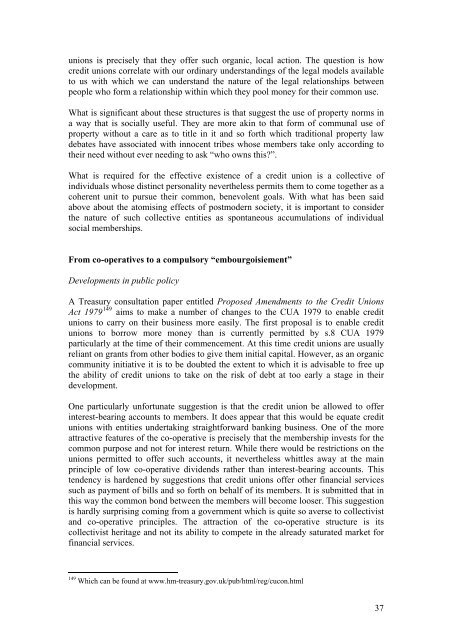The Unbearable Lightness of Property - alastairhudson.com
The Unbearable Lightness of Property - alastairhudson.com
The Unbearable Lightness of Property - alastairhudson.com
Create successful ePaper yourself
Turn your PDF publications into a flip-book with our unique Google optimized e-Paper software.
unions is precisely that they <strong>of</strong>fer such organic, local action. <strong>The</strong> question is how<br />
credit unions correlate with our ordinary understandings <strong>of</strong> the legal models available<br />
to us with which we can understand the nature <strong>of</strong> the legal relationships between<br />
people who form a relationship within which they pool money for their <strong>com</strong>mon use.<br />
What is significant about these structures is that suggest the use <strong>of</strong> property norms in<br />
a way that is socially useful. <strong>The</strong>y are more akin to that form <strong>of</strong> <strong>com</strong>munal use <strong>of</strong><br />
property without a care as to title in it and so forth which traditional property law<br />
debates have associated with innocent tribes whose members take only according to<br />
their need without ever needing to ask “who owns this”.<br />
What is required for the effective existence <strong>of</strong> a credit union is a collective <strong>of</strong><br />
individuals whose distinct personality nevertheless permits them to <strong>com</strong>e together as a<br />
coherent unit to pursue their <strong>com</strong>mon, benevolent goals. With what has been said<br />
above about the atomising effects <strong>of</strong> postmodern society, it is important to consider<br />
the nature <strong>of</strong> such collective entities as spontaneous accumulations <strong>of</strong> individual<br />
social memberships.<br />
From co-operatives to a <strong>com</strong>pulsory “embourgoisiement”<br />
Developments in public policy<br />
A Treasury consultation paper entitled Proposed Amendments to the Credit Unions<br />
Act 1979 149 aims to make a number <strong>of</strong> changes to the CUA 1979 to enable credit<br />
unions to carry on their business more easily. <strong>The</strong> first proposal is to enable credit<br />
unions to borrow more money than is currently permitted by s.8 CUA 1979<br />
particularly at the time <strong>of</strong> their <strong>com</strong>mencement. At this time credit unions are usually<br />
reliant on grants from other bodies to give them initial capital. However, as an organic<br />
<strong>com</strong>munity initiative it is to be doubted the extent to which it is advisable to free up<br />
the ability <strong>of</strong> credit unions to take on the risk <strong>of</strong> debt at too early a stage in their<br />
development.<br />
One particularly unfortunate suggestion is that the credit union be allowed to <strong>of</strong>fer<br />
interest-bearing accounts to members. It does appear that this would be equate credit<br />
unions with entities undertaking straightforward banking business. One <strong>of</strong> the more<br />
attractive features <strong>of</strong> the co-operative is precisely that the membership invests for the<br />
<strong>com</strong>mon purpose and not for interest return. While there would be restrictions on the<br />
unions permitted to <strong>of</strong>fer such accounts, it nevertheless whittles away at the main<br />
principle <strong>of</strong> low co-operative dividends rather than interest-bearing accounts. This<br />
tendency is hardened by suggestions that credit unions <strong>of</strong>fer other financial services<br />
such as payment <strong>of</strong> bills and so forth on behalf <strong>of</strong> its members. It is submitted that in<br />
this way the <strong>com</strong>mon bond between the members will be<strong>com</strong>e looser. This suggestion<br />
is hardly surprising <strong>com</strong>ing from a government which is quite so averse to collectivist<br />
and co-operative principles. <strong>The</strong> attraction <strong>of</strong> the co-operative structure is its<br />
collectivist heritage and not its ability to <strong>com</strong>pete in the already saturated market for<br />
financial services.<br />
149 Which can be found at www.hm-treasury.gov.uk/pub/html/reg/cucon.html<br />
37













